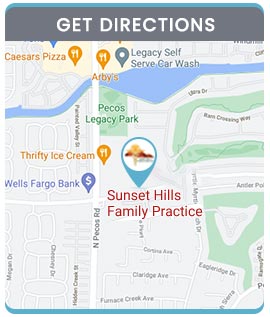Allergy Treatment Doctor in Henderson, NV
An allergy is an adverse reaction of the body’s immune system to a foreign substance or food that most people can safely consume. It can range from mild to severe. Common symptoms include sneezing, itching, and congestion. To relieve symptoms caused by exposure to allergens like pollen, dust, pet, or certain foods, talk to our team of medical professionals at Sunset Hills Family Practice in Henderson, NV today to learn more about our treatment options. For more information, contact us today or schedule an appointment online.


Table of Content:
What is an allergy?
How common are allergies?
How can I improve my allergies?
How Do I Know if It’s an Allergy or a Cold?
An allergy is a negative reaction that the body’s immune system has to a foreign substance or food that most people can interact with without having an issue. The item that the body is reacting to and fighting against is called an allergen and can be a food, chemical, airborne substance, or anything else that the body comes into contact with. Antibodies are produced by the immune system when it detects a substance that it deems as being harmful, even if it isn’t actually going to hurt you. This reaction to the foreign substance upon contact is what causes the allergic reaction, which can present itself in many forms depending on the type of allergen and contact. Allergic reactions can appear in the form of a rash or swelling to the skin, congestion of the sinuses, narrowing of airways and issues in the digestive system. Allergies can range from mild reactions that individuals see as a minor irritation to severe reactions such as anaphylaxis which can be life-threatening due to the closing of the airways, making it impossible to breathe.
Due to the nature of allergies and the fact that they are truly unique to each individual’s response to substances that the body comes into contact with, allergies are quite common. Allergies can appear as the result of a reaction to food, insect bites, medications, airborne substances, and any other substance that comes into contact with the skin. Common food allergies include peanuts, tree nuts, soy, fish, shellfish, milk, eggs, and wheat with reactions such as tingling in the mouth, hives, swelling of the face, throat, lips, or tongue, and anaphylaxis. Insect bite allergies typically come from wasps or bees, with reactions including swelling at the sting site, itching or hives, coughing, wheezing, tightness in the chest or shortness of breath, and anaphylaxis. Penicillin is the most common medication that people are allergic to and symptoms of an allergic reaction can include a rash, itchy skin, facial swelling, wheezing, and anaphylaxis. Airborne allergies in the form of dust mites, pollen, pet dander, pollution, and smoke typically cause sneezing, runny or stuffy nose, itchy nose or eyes, and watery, red, or swollen eyes. Contact allergens in the form of latex, chemicals, or any other substance that touches the skin will cause itchiness, redness and flaky or peeling skin at the contact site.
There is no cure for allergies, but they can be managed through the use of antihistamine medications or through allergy shots depending on the frequency and severity of your allergic reactions. Working with your doctor or an allergist can help determine the best course of treatment for your unique situation based on the allergens that you react to and how severe they are. Avoidance is the easiest method for controlling your allergies but that isn’t always possible, particularly if the allergen is airborne such as pollen or smoke. Allergy medications can be over-the-counter or prescription pills, liquids, nasal sprays, or eye drops. Allergen immunotherapy can be used to help relieve severe allergies or allergies that don’t respond to other treatments. This involves injecting purified allergen extract over the course of a few years to help the body build up an immunity to the allergen and reduce the severity of the reaction. For allergic reactions with life-threatening reactions, there is an option of an emergency epinephrine shot that can easily be carried at all times. If you come into contact with an allergen that triggers an anaphylaxis reaction, the epinephrine will reduce the severity of symptoms until you can get emergency treatment.
Colds and allergies share some common symptoms, making it hard to potentially tell the difference between the two. Monitoring your symptoms and the timing of them can help you determine if you have a cold or if you’re suffering from allergies. For example, if you find that you get symptoms every spring when the weather starts to warm up and flowers and trees start to bloom, chances are good you are suffering from allergies and not a cold. Some symptoms are also unique to each illness so you can use your symptoms to help determine which one you are suffering from. If you are experiencing symptoms such as itchy, watering eyes then you most likely are having an allergic reaction. A cold on the other hand could be distinguished from allergies with symptoms such as a fever, sore throat, or general aches and pains. Colds are typically shorter in duration, with symptoms lasting up to a week or two, whereas seasonal allergies can last several weeks. Allergic reactions other than seasonal allergies tend to last only a few hours to a couple of days depending on exposure to the allergen. For more information, contact us or schedule an appointment online. We are located at 2510 Wigwam Pkwy Suite 102, Henderson, NV 89074. We serve patients from Henderson NV, Paradise Hills NV, Winchester NV, Gibson Springs NV, Midway NV, and surrounding areas.




